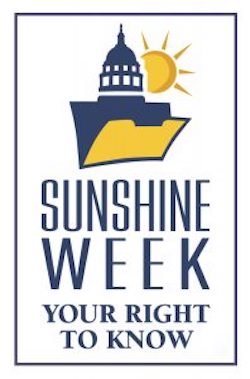SEJournal Online is the digital news magazine of the Society of Environmental Journalists. Learn more about SEJournal Online, including submission, subscription and advertising information.
WatchDog: Sunshine Events, Standing Rock, FERC and Pruitt
By Joseph A. Davis, WatchDog TipSheet Editor
 |
1. Sunshine Week Points up Need for More Openness in Government
Government transparency is needed every week. But every March, journalism and civil society groups celebrate the need for “sunshine” on the dark corners of government. This year, Sunshine Week is this week, March 12-18.
Special events happen around the country. Many are listed on the Sunshine Week website.
While some of the events are in Washington, D.C., many more are held around the country: Tallahassee, Fla.; Manchester, N.H.; Boston; Appleton, Wis.; Minneapolis; Greencastle, Ind.; Las Cruces, N.M., and San Francisco, to name a few.
Some events will be livestreamed. On March 15 at 1:30 p.m. EDT, the American Library Association will livestream a panel on “Accessing Information in the Trump Administration.” You can participate via WebEx in a Commerce Department event on open data on March 14 at 9:00 a.m. EDT. The Office of Government Information Services (“the FOIA ombudsman”) was scheduled to hold an event March 13 at 1:00 p.m. EDT, which was also livestreamed.
Sunshine Week is organized by the American Society of News Editors and Reporters Committee for Freedom of the Press, with funding from the John S. and James L. Knight Foundation and The Gridiron Club and Foundation.
2. SEJ, Other J-Groups Urge Dropping of Charges Against Standing Rock Journalists
The Society of Environmental Journalists has joined other press-freedom groups in calling for charges to be dropped against at least 10 journalists arrested in recent months for covering the protests against the Dakota Access Pipeline. Some of those journalists were in court March 2, 2017. Eight journalism groups, led by the Committee to Protect Journalists, signed a letter to the Morton County, N.D., state's attorney.
"We are concerned that the arrests of journalists can have a chilling effect on press freedom and discourage media from covering stories that are in the public interest," the groups wrote. "In the case of Standing Rock, several journalists told CPJ they have shied away from covering protests or getting too close to police action to avoid being arrested again. While we acknowledge that journalists are sometimes temporarily detained in emergency situations, a case where several journalists face criminal charges for simply doing their job is unacceptable."
CPJ reporter Alexandra Ellerbeck documented cases of journalists who had been arrested in connection with the pipeline protests at the Standing Rock Reservation. Most were freelancers or reporters with small outlets who could not easily afford legal representation. They included Christopher Schiano, Nicholas Georgiades, Sara LeFleur-Vetter, Jihan Hafiz, Adam Schrader, Jenifer Stum, Jenni Monet, Lorenzo Serna, Jennifer Schreiter and Myron Dewey.
Groups signing the letter were the Committee to Protect Journalists, the Society of Environmental Journalists, the Reporters Committee for Freedom of the Press, the Native American Journalists Association, Reporters Without Borders, the Society of Professional Journalists, the National Press Photographers Association and the Freedom of the Press Foundation.
Here is the text of the letter sent March 2, 2017, by the journalism groups.
3. SEJ Objects to FERC’s Non-Public Public Meeting Format
In the face of rising protests from anti-fracking and anti-pipeline activists, the Federal Energy Regulatory Commission has adopted a format for some meetings that prevents the press from covering public comment in real time.
The Society of Environmental Journalists has expressed concern to FERC about this practice, which also prevents the public from engaging in dialogue. The text of SEJ's Feb. 23, 2017 letter is here.
In one case in Wilson, N.C., FERC officials would not allow the news media to work inside the auditorium where a “public” listening session was being held the night of Feb. 14, 2017.
The issue was the 600-mile Atlantic Coast Pipeline, which would carry natural gas from West Virginia to Virginia and North Carolina. The purpose of the Feb. 14 meeting was for FERC to gather public comments on its draft environmental impact statement for the pipeline.
Read more about this key press access issue here.
4. Pruitt Emails: A FOIA for the Ages
The U.S. Senate (at least its GOP senators) did not want to see emails that deepened documentation of Oklahoma Attorney General Scott Pruitt’s cozy relationship with the oil and gas industry before it confirmed him as EPA administrator Feb. 17. The emails were not released under Oklahoma open records law until several days later, on Feb. 21.
But you can read them for yourself. Most of the 7,564 pages, in only slightly redacted form, are here, in 10 batches, in pdf form on DocumentCloud.
This was a case in which an open-records request by a journalist yielded more results than a request for information by the Senate Environment Committee. Committee Democrats had asked for much of the same information, but never received it.
Major credit goes to investigative journalist Nick Surgey, who works for the nonprofit Center for Media and Democracy. It was Surgey who FOIA’d the emails, and CMD lawyers who pressed the Oklahoma AG’s office when it stonewalled. Surgey had previously documented how fossil-fuel groups had paid hundreds of thousands of dollars to the Republican Attorneys General Association in support of its lawsuit challenging the Obama Clean Power Plan.
* From the weekly news magazine SEJournal Online, Vol. 2, No. 11. Content from each new issue of SEJournal Online is available to the public via the SEJournal Online main page. Subscribe to the e-newsletter here. And see past issues of the SEJournal archived here.











 Advertisement
Advertisement 


